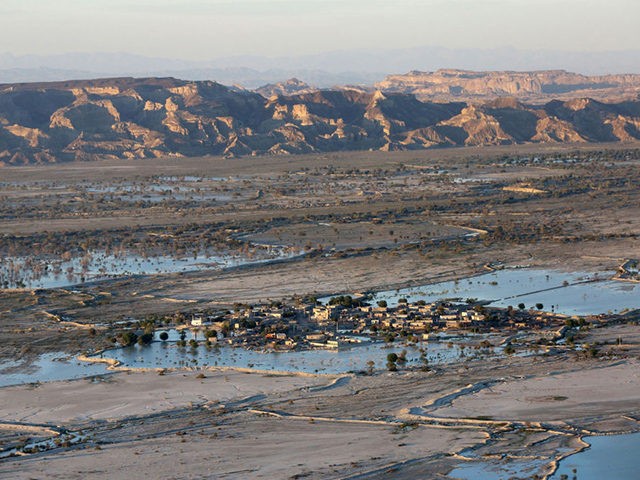The Islamic Revolutionary Guard Corps (IRGC) of Iran reportedly opened fire on protesters in the city of Saravan on Monday, killing and injuring an unconfirmed number of people.
Protesters responded Tuesday by storming the governor’s office in Saravan and damaging some police vehicles.
UPDATE – #IranProtests 23 Feb:
Protesters close Chabahar-Rask Route in solidarity with residents of Saravan who took over the Governor’s Office after the IRGC killed Baluchi fuel porters in Iran.
The opposition MEK says the IRGC killed 40 & injured 100+ Baluchis in past 2 days. pic.twitter.com/sXzOvyQ8cQ
— M. Hanif Jazayeri (@HanifJazayeri) February 23, 2021
Saravan is located in the province of Sistan-Baluchistan, close to the borders with Pakistan and Afghanistan. Many of the residents are members of the Baloch ethnic minority, which also populates the neighboring regions of Pakistan and Afghanistan. The Baloch have their own distinctive culture, dress, and language. They are predominantly Sunni Muslims, while a Shiite theocracy rules Iran.
Much like the Kurds, the Baloch believe their ancestral homeland was unfairly divided by arbitrarily-drawn national borders in the colonial era and some dream of restoring Balochistan as an independent state.
This prospect entices the governments of Pakistan, Iran, and Afghanistan roughly as much as the drive for Kurdish statehood pleases the rulers of Syria, Turkey, and Iraq. The territory that would become Balochistan is strategically vital, includes major port cities, and boasts valuable mineral deposits.
Baloch insurgencies have been running at varying levels of intensity in Pakistan and Iran for decades. Sistan-Baluchistan is considered one of the most restless provinces in Iran and experiences sporadic attacks on Iranian troops or law enforcement by Sunni radicals. Iran sometimes accuses the Pakistanis of allowing these radicals to cross the border and find shelter. At least five Baloch activists captured by Iranian security forces have been executed so far this year.
Human rights organizations view the Baloch (sometimes alternately called the Baluch or Baluchis) as a persecuted minority everywhere they live, with especially brutal repression in Pakistan. The Baloch in Pakistan have recently been demonstrating against a number of unexplained disappearances they believe were kidnappings the Pakistani security forces orchestrated.
The Baloch in Iran have been coping with extreme poverty by smuggling fuel — and sometimes drugs — across the border. Fuel is exceptionally cheap in Iran thanks to heavy government subsidies. The smugglers are known as sookhtbars, or “fuel carriers.” The Iranian government officially treats the sale of subsidized fuel to foreign buyers as theft from the State, but it usually indulges the practice in Sistan-Baluchistan because it knows fuel smuggling is the only way for many of the residents to earn a living.
“Every month, I put my life at risk to visit the border to smuggle Iranian oil so that I can put food on my family’s table. The government has always ignored Balochistan. Unlike Punjab, we do not have factories or other major sources of employment here,” a fuel smuggler told Radio Free Europe’s Afghan-Pakistan news service Gandhara two weeks ago. The smuggler said he holds a PhD., but was obliged to take up his “risky job” to feed his family.
“Our lands have dried up due to a lack of rain. So, we took up this job where we risk our lives driving through granite mountains and shabby dirt roads. All our journeys are miserable, and every moment is full of risk,” another smuggler complained.
The IRGC closed the Sistan-Baluchistan border Monday, moving artillery and armor into position to enforce its edicts, and reportedly fired on some of the fuel carriers, killing at least eight people. When angry locals protested the border closing, the IRGC turned its guns on them.
#IranProtests#SistanAndBaluchestan—in response to #IRGCTerrorists' cruel murder of at least eight Baluch fuel carriers in Saravan city, locals raided and conquered the local Governorate.#StopKillingFuelCarriers pic.twitter.com/SxX2zaprlQ
— Iran News Update (@IranNewsUpdate1) February 23, 2021
“The IRGC used heavy machine guns to fire on the porters and set several of their vehicles ablaze. The security forces later opened fire on a village that was near the area the incident took place, causing all residents to flee,” the Iranian opposition group PMOI/MEK said on Tuesday, posting photos of six of the fuel carriers killed by the IRGC.
According to the MEK, the protesters refused to disperse after the IRGC shot at them, and it was the Iranian theocracy’s brutal enforcers who fled the scene. The protesters managed to occupy the governor’s office in Saravan, and unrest soon spread across the border into Pakistan Balochistan, prompting Pakistani officials to close the border from their side.
The MEK estimated the IRGC has killed at least 40 Baloch and injured at least a hundred more since Monday. At least one of the dead fuel carriers was identified as a Pakistani national.
IRGC media outlets claimed most of the gunfire came across the border from Pakistan, and that Iranian troops only resorted to using force when fuel carriers tried to storm the border. The most cynical observers of the crisis accuse the IRGC of closing the border and attacking the fuel carriers because its commanders are protecting their own profitable smuggling operations.

COMMENTS
Please let us know if you're having issues with commenting.